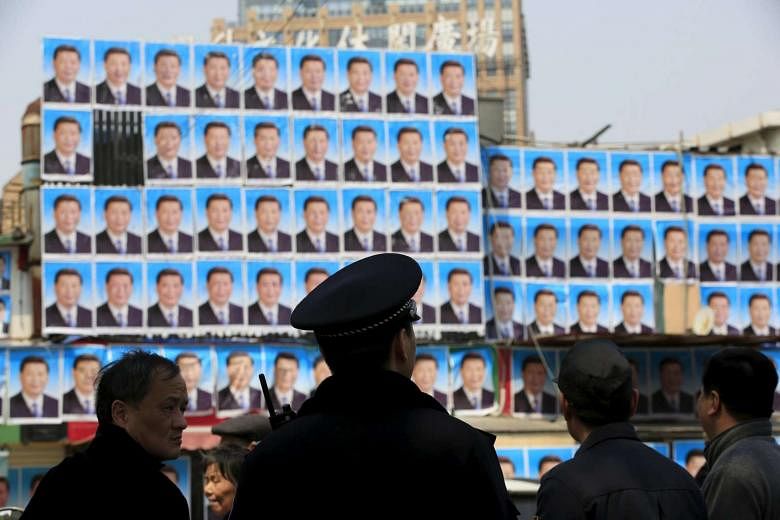The tale of China's economy is being burnished, and the authorities in the mainland and Hong Kong are cracking the whip on naysayers.
In Hong Kong, there are concerns about freedom of expression in the wake of action by securities regulators against the producers of two research reports - both critical of listed mainland companies. On the mainland, business reporters and analysts are being reined in, as government officials attempt to foster a climate of "zhengnengliang" or "positive energy", said the Wall Street Journal yesterday, citing sources.
The moves come as investors grow increasingly sceptical about the Chinese government's ability to navigate a slowing economy. China's stock markets were the world's second-worst-performing in the past year.
In Hong Kong, where many mainland firms are listed, the Securities and Futures Commission (SFC) in March determined that credit ratings agency Moody's had put out a research note in 2011 on Chinese firms that was "unfair, unclear and misleading".
The US firm was fined HK$23 million (S$4 million) and an appeals panel upheld the findings, though it reduced the penalty to HK$11 million. Last Thursday, Moody's appealed against the latest judgment.
There is also an ongoing case involving American short-seller Andrew Left. The SFC accuses him of market misconduct for a 2012 note alleging Guangzhou-based real estate developer Evergrande had used accounting tricks to "mask" insolvency.
Evergrande, which saw its share price slump, denied the allegations and later made a police report.
The SFC brought both charges in 2014.
Activists and industry players are worried that critical commentary on corporate Hong Kong may be stifled. Veteran corporate governance activist David Webb, writing on the Moody's judgment, said: "It sets far too high a floor on the acceptable standards of critical research, and will have a chilling effect on negative criticism of companies in Hong Kong, in a market in which there is little enough of that already."
In another note, former Goldman Sachs research head Paul Bernard and Mr Tan Chin Hwee, who helms Dutch trading company Trafigura Group in the Asia-Pacific, wrote: "Fairly or unfairly, investors will view opinions as being less easily freely stated than before, and this will damage Hong Kong's markets."
The censured report by Moody's analysts was published in July 2011. Entitled "Red Flags For Emerging-Market Companies: A Focus On China", it analysed 61 Chinese firms and assigned red flags to those with possible governance and accounting risks. After its publication, many firms saw their share prices drop. The SFC criticised Moodys' for failing to provide "sufficient explanations" and to "ensure the accuracy" of the red flags assigned to the firms.
While not a credit rating review, the research note should still be held to high standards, and Moody's had failed to "act fairly, in the best interests of its clients, and the integrity of the market", said the regulator. It is unlikely the SFC's actions are coordinated with the central government.
Asked if the regulator could have been prompted to act because the damning reports were of mainland firms, Mr Webb told The Straits Times he has no evidence to suggest such "discrimination".
Still, the cases are under scrutiny, given that mainland firms now have a dominant presence on the Hong Kong exchange. Mainland firms have been criticised for poor disclosure standards and opaque financial statements.
Hong Kong's tradition of free flow of information, undergirded by its legal and regulatory system, helped highlight risks and give the city a reputation as the best jurisdiction in which to trade securities for mainland companies.
Now, this reputation is damaged, said Mr Bernard and Mr Tan in their note. "Though the SFC and Appeals Tribunal took pains to state that this (Moody's) case was not about limiting free speech in Hong Kong or its financial markets, the juxtaposition of this with the recent case of the missing booksellers is unfortunate."
They were referring to the recent saga of Hong Kong booksellers who, many believe, were seized by mainland security agents, in a breach of the "one country, two systems" framework.
Commercially produced research is regulated in most places, including Singapore. What is of concern is that Moody's is being penalised for "minor errors", said Mr Webb.
"If the errors in a research report are so minor that they are unlikely to give rise to successful actions for libel and defamation, then there is little justification for regulatory intervention."
None of the companies named in the Moody's report had sued the research firm.
Mr Webb, in another note, said: "One of Hong Kong's core competitive advantages over mainland China is supposed to be the ability to speak freely."


